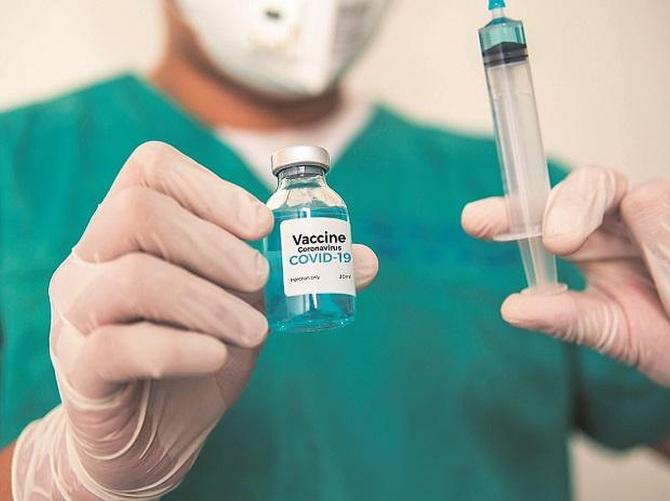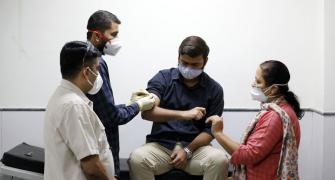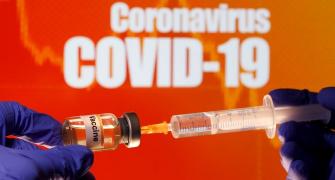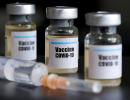India's first mRNA platform-based vaccine will remain stable at 2-8 degrees Celsius while Pfizer-BioNTech's vaccine needs minus 70 degrees Celsius and Moderna vaccine can remain stable for six months at minus 20 degrees Celsius, reports Sohini Das.

Pune-based Gennova Biopharmaceuticals' Covid-19 vaccine candidate HGCO19, India's first messenger ribonucleic acid (mRNA) platform-based vaccine, will remain stable at 2-8 degrees Celsius, unlike its global peers -- BNT162b2 (from Pfizer-BioNTech) and mRNA-1273 (from Moderna) -- that require sub-zero temperatures.
The company received conditional permission for phases 1 and 2 human clinical trial of the Covid-19 vaccine developed by it after the subject expert committee (SEC) deliberated on its proposal.
The firm presented its proposal, along with data from the animal toxicity study, before the SEC, which granted permission for Phases 1 and 2 clinical trial on the condition that the interim results of the phase 1 study are submitted to the committee before proceeding to the next phase.
The Drugs Controller General of India has approved the same.
Sources close to the development claimed that HGCO19 can remain stable at 2-8 degrees Celsius, thus, making the logistics easier.
"In a country like ours it is not viable to have vaccines that will require stringent temperature requirements of minus 70 degrees Celsius or minus 20 degrees Celsius to remain stable. These will make it virtually impossible to penetrate the hinterland," said a source.
Gennova has tied up with Seattle-based HDT Biotech Corporation and received seed funding from the Department of Biotechnology for developing this candidate.
The Centre has remained in constant touch with the vaccine maker.
Only recently, Gennova Chief Executive Officer Sanjay Singh had a virtual meeting with Prime Minister Narendra Modi, along with other vaccine players.
Singh was unavailable for comment till the time of going to press.
'HGCO19 has already demonstrated safety, immunogenicity, neutralisation antibody activity in the rodent and non-human primate models. Gennova is working aggressively during this challenging period to ensure its first human injection by the end of 2020 or early, subject to Indian regulatory approvals,' the company stated on its website.
How does HGCO19 work?
The messenger RNA vaccine candidate contains a short, synthetic version encoding the spike protein (antigen) of the novel coronavirus Sars-CoV-2.
This interacts with the receptors of host cells.
When the vaccine is injected into the body, the synthetic mRNA is taken to muscle cells where it instructs the cells to make numerous copies of the mRNA and copies of the antigen.
This primes the body's immune system which learns to identify the coronavirus and protect the body when it is attacked by the actual virus.
The mRNA vaccines typically have stringent temperature requirements to remain stable.
Pfizer-BioNTech vaccine needs minus 70 degrees Celsius, while Moderna vaccine can remain stable for six months at minus 20 degrees Celsius.
Suman Chakraborty, dean, Sponsored Research and Industrial Consultancy and Innovator of the Rapid Diagnostic Technology COVIRAP, IIT Kharagpur, explained, "The mRNA-based vaccines are new technology platforms. The key to this technology is that it is much faster than the conventional vaccines.
"The challenge is that it requires stringent temperature requirements to remain stable since the mRNA is easily destroyed. There are numerous enzymes that will break these apart."
However, Chakraborty adds that by modifying the building blocks of mRNA (nucleotides) -- sort of genetic modification -- one can come up with modified versions that are more stable in a wider temperature range.
"There are well-known technologies like lipid coating, etc that can help with the stabilisation. The crucial bit is that for a specific pathogen, this recipe has to be standardised. Once this is standardised, the enzymes will break down the mRNA, but this will happen slowly," he explains.
Gennova has associated mRNA with lipid inorganic nanoparticle that acts as an mRNA vaccine delivery system, which stabilises the mRNA and also acts as adjuvant till delivery into patients.
Vaccines typically use adjuvants to improve the immune response.
Adjuvants are pharmacological or immunological agents that improve the immune response of a vaccine.
As for genetically modifying the mRNA, a firm like Pfizer would also be aware of the technologies available, feels Chakraborty, but it has chosen to be more conservative.
This is because the manufacturer needs to assess the stability data in different storage conditions over long periods of time.
But, in the pandemic, time is of essence. To assess the stability in different temperatures, one needs more clinical trials and thus, more time.
"We do not know what technology any vaccine company is using as it is proprietary, but in-principle it is possible. But, stability data has to be time-proven," adds Chakraborty.










